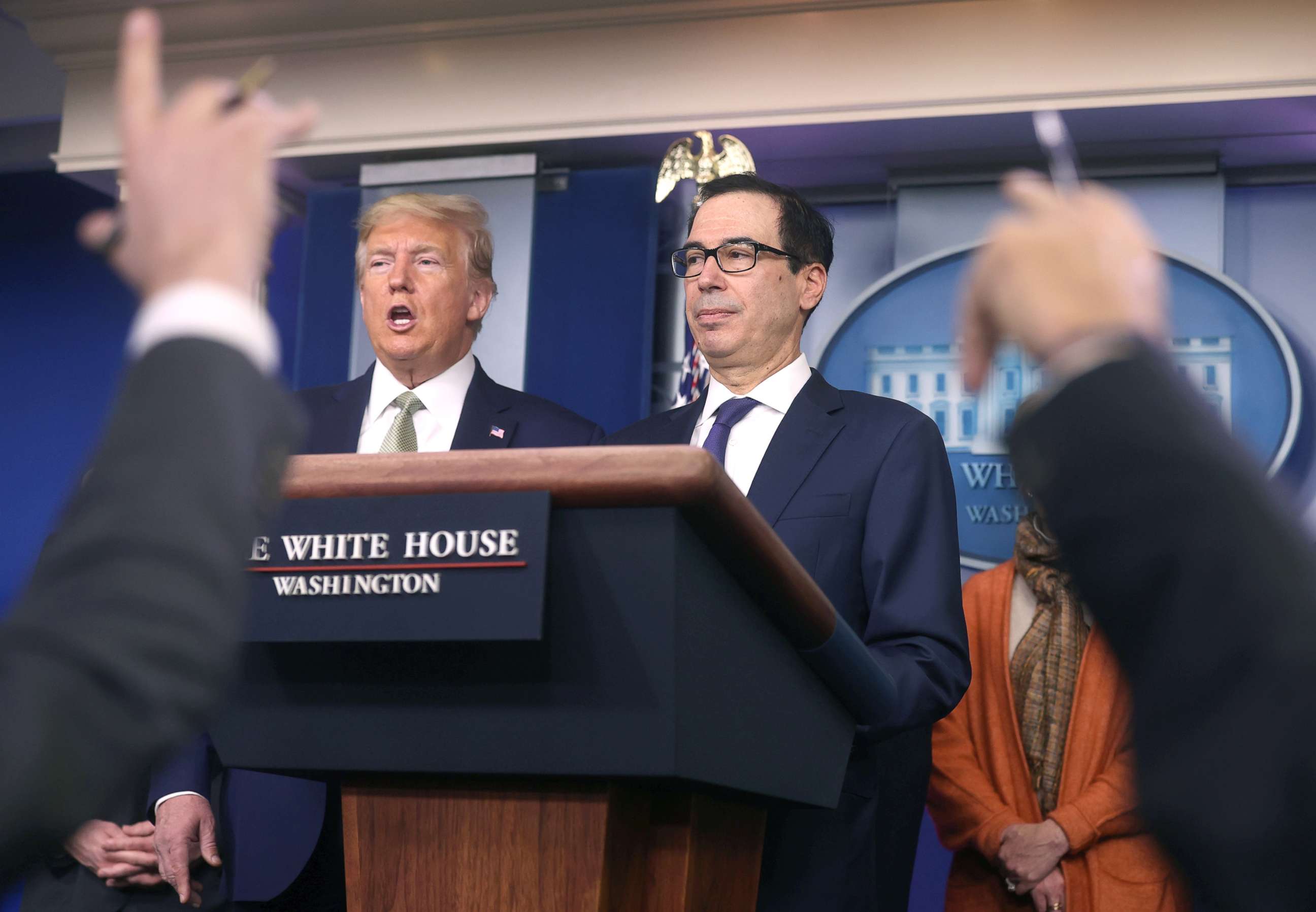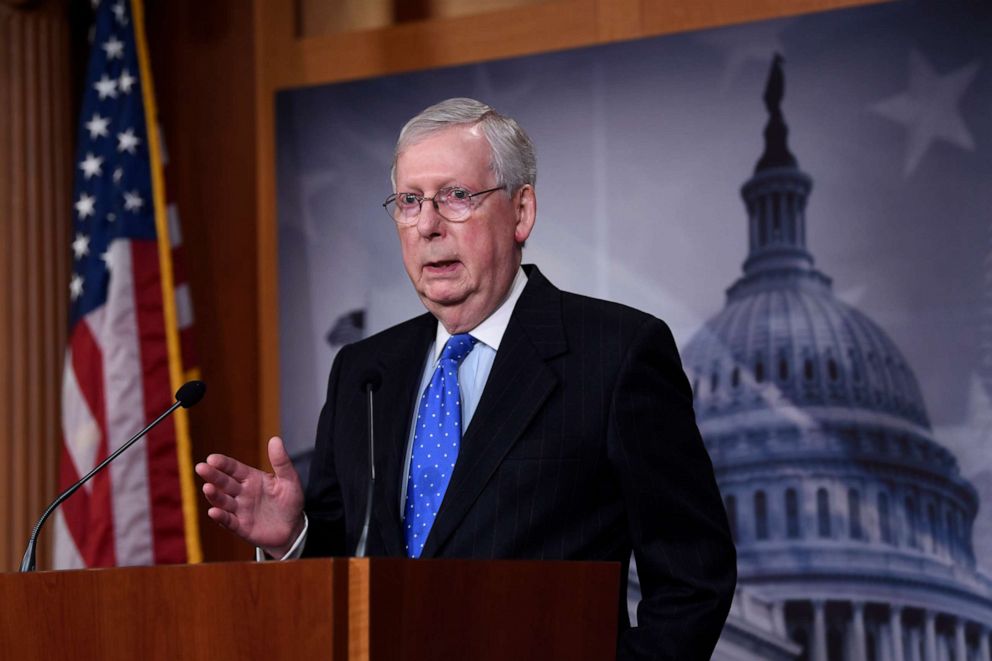White House, Senate GOP working on $1T stimulus package, cash payments to Americans
The plan would call for some $500 billion in checks of at least $1,000 each.
After leaving a White House news conference with President Donald Trump, Treasury Secretary Steven Mnuchin met behind closed doors with Senate Republicans for a little over an hour Tuesday, pitching lawmakers on a $1 trillion economic stimulus package, the third infusion of emergency spending designed to help a U.S. economy crushed by the novel coronavirus outbreak, a measure that would include direct payments to Americans.

“It may go over $1 trillion,” Sen. Mike Rounds, a South Dakota Republican, told reporters as he exited the lunch meeting.
"It is a big number. This is a very unique situation in this economy," Mnuchin told reporters after the lunch, outlining three general areas of focus for the next phase of stimulus aid, saying, "This is a combination of loans. This is a combination of direct checks to individuals. This is a combination of creating liquidity for small businesses.”
A central piece of the plan pitched by the Trump administration is one that would involve roughly $500 billion in total direct cash payments to Americans done in two “tranches,” with the goal of getting the first checks of “at least $1,000” out by the end of April, according to a senior administration official. The second batch of checks would go out two months later, but only if the U.S. is still under a national emergency declaration, according to the senior official.
Tune into ABC News Live at 1 p.m. EDT every weekday for the latest news, context and analysis on the novel coronavirus, with the full ABC News team where we will try to answer your questions about the virus.
Republicans seemed receptive as they left the meeting Tuesday, though they cautioned that much is not yet set in stone about the third stimulus package
Sen. Mitt Romney, R-Utah, who has pitched giving every American adult $1,000 to combat the virus’ negative economic effects, said, “It’s too early to tell what it’s going to look like.”
Not everyone was on board with the check proposal, though.
Trump ally Sen. Lindsey Graham of South Carolina told reporters, “My focus is not giving people a check from the government. My focus is to make sure you get your paycheck from your employer. I'm willing to float loans to employers to make sure the payroll continues. That's phase three.”

Senate Republican Leader Mitch McConnell told reporters Tuesday that he intended to act with “warp speed” on a third package, but the senator then outlined a process that could to take time to yield a final product, though he was clear that no one is leaving the Senate until a third package has been approved.
McConnell, R-Kentucky, assigned a handful of his conference to three different task forces to each propose pieces of the next stimulus package.
Senate Appropriations Committee Chairman Richard Shelby will helm one task force to focus on airline assistance, according to a spokeswoman. Sen. Roger Wicker, R-Miss., who chairs a committee focused on the transportation industry, and Senate GOP Whip John Thune, will work with Shelby to craft a proposal sensitive to GOP concerns that there be no industry “bailouts,” measures used in past economic crises unpopular with Republicans.
According to the Shelby aide, the chairman “agrees with Secretary Mnuchin that the best way to help the airlines weather this storm is to provide liquidity through collateralized lending.”
A group of GOP senators, led by Senate Small Business Committee Chairman Marco Rubio, met Tuesday afternoon to talk about getting liquidity to small businesses that are cash-strapped in the current crisis, this being the focus of the second task force.
Senators are looking at using community bank loan programs to expand lending, according to a senior GOP aide, but “how much will get backstopped by the federal government is a key question,” among others.
A third panel is looking at how to speed aid to Americans.
What to know about coronavirus:
- How it started and how to protect yourself: coronavirus explained
- What to do if you have symptoms: coronavirus symptoms
- Tracking the spread in the US and Worldwide: coronavirus map
Once Republicans agree on a plan, then negotiations would begin with Democrats.
Senate Democratic Leader Chuck Schumer, D-N.Y., unveiled a $750 billion Democratic stimulus plan Tuesday, one that he said focuses on solving medical problems and getting aid directly to hurting workers and small businesses. He also advocated for mobilization of the national guard to assist hard-hit states.
Schumer said the president and Republicans were too focused on corporations and not enough on workers.
"They're worried about the big businesses. They want to pump some money into the economy," Schumer said. "But if you don't solve the immediate healthcare and economic needs of the people who are hurt, the problem will just get worse, and the airlines will be in worse shape, and the economy will be in worse shape.”
Schumer said that any proposed financial assistance to the airlines and travel and leisure industries would need to be "worker focused." The Democratic leader said this aid should focus on a $15 minimum wage for workers in these industries, and help lower income workers keep their benefits.
"I know the president is talking to the airline industry. He's talking to the travel industry. He's talking to the leisure industry. And we just want to make sure whatever help we give them, workers come first," Schumer said.
A good deal of the focus on the GOP lunch on Tuesday with Mnuchin was on concerns about the stimulus bill passed by the House.
Sen. Mike Braun, an Indiana Republican, said, “There was a big discussion about making sure those who need paid sick leave don’t cripple small businesses who will have to pay it out."
McConnell told reporters, “A number of my members think there were considerable shortcomings in the House bill. My counsel to them is to gag and vote for it anyway, even if they think it has some shortcomings and to address those shortcomings in the bill that we’re in the process of crafting.
Much is still unclear about what will ultimately be approved in a third stimulus bill, but one thing is certain: McConnell has placed himself and Senate Republicans in a position to directly negotiate with the White House and Secretary Mnuchin on what the package will include, unlike the last stimulus bill which was largely negotiated by the Treasury Secretary Mnuchin and House Speaker Nancy Pelosi.
ABC News Chief White House Correspondent Jonathan Karl contributed to this report.






